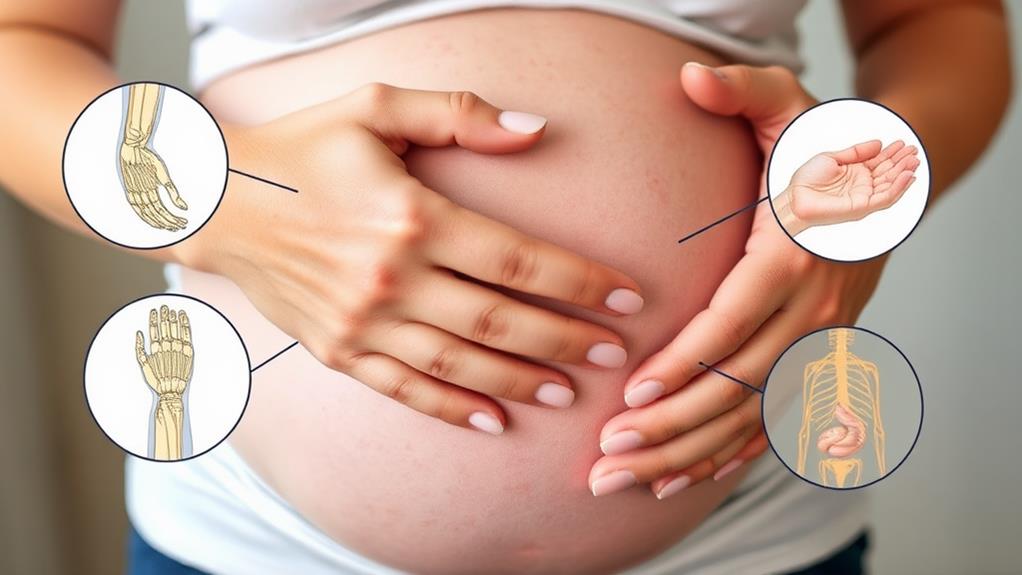If you're experiencing tingling or numbness in your hands during pregnancy, it might be a sign of carpal tunnel syndrome (CTS), a condition that affects many expectant individuals. Understanding how hormonal changes and fluid retention contribute to these symptoms is crucial for managing discomfort. While treatments like wrist splints and physical therapy can help alleviate the pain, knowing when to seek professional advice is equally important. The journey doesn't end after giving birth, as many women face lingering effects. So, how can you navigate this condition effectively during and after pregnancy?
Overview of Carpal Tunnel Syndrome

Carpal tunnel syndrome (CTS) is a condition that arises when the median nerve, which runs through the wrist, gets compressed. This can lead to some pretty annoying symptoms, like tingling, numbness, and pain in your hands and fingers.
If you're pregnant, you might notice these symptoms even more. About 30% to 62% of pregnant individuals experience CTS, thanks to fluid retention and hormonal changes.
You might find that your grip strength weakens, making it harder to hold onto things. Sometimes, your hands might feel clumsy, and you could even feel pain radiating up your arm, especially at night. Isn't that just the icing on the cake during pregnancy?
If you think you might've CTS, doctors usually start with a physical exam and ask about your symptoms. They might even do some electrodiagnostic tests to check your median nerve function.
For treatment, conservative options like using a wrist splint or modifying your activities are often recommended. The good news is that most of the time, symptoms resolve after you give birth. So, hang in there!
Symptoms of Carpal Tunnel Syndrome
During pregnancy, the symptoms of carpal tunnel syndrome (CTS) can be particularly bothersome. You might notice numbness and tingling in your fingers, wrists, and hands, and these feelings often get worse at night. It's like your hands have a mind of their own, right?
About 50% of people with CTS during pregnancy feel these symptoms in both hands, especially as you approach the third trimester when things really peak.
You could also experience weakness in grip strength, making it tough to hold onto things or perform those fine motor tasks, like buttoning a shirt or typing. Ouch! Pain in the hands can be a real hassle, too. Some people even feel a burning sensation in their fingers or pain that shoots from the wrist to the arm or shoulder.
If you're wondering about the numbers, the incidence of CTS during pregnancy ranges from 30% to 62%.
The good news? Many find that these symptoms fade away within 12 months after giving birth. So, hang in there! You're not alone, and there's light at the end of the tunnel.
Causes of Carpal Tunnel Syndrome

Experiencing carpal tunnel syndrome (CTS) in pregnancy often stems from the compression of the median nerve in your wrist, primarily due to swelling and inflammation. This condition is pretty common in pregnancy, affecting around 30% to 62% of pregnant people.
You might notice it more in the third trimester when those little feet are making your body swell like a balloon!
The causes of carpal tunnel can be linked to increased fluid retention, which narrows the carpal tunnel and puts pressure on the nerve in your wrist. If you've got risk factors like being overweight before pregnancy, having gestational diabetes, or a family history of the condition, you might be more likely to experience tunnel syndrome during pregnancy.
Also, if you're doing repetitive hand and finger movements—like typing or gripping—this can lead to more swelling or inflammation, making CTS symptoms worse.
So, it's important to take breaks and stretch those hands! Remember, you're not alone in this; many others share these experiences.
Diagnosis of Carpal Tunnel Syndrome
Because symptoms of carpal tunnel syndrome (CTS) can overlap with other conditions, diagnosing it during pregnancy requires careful evaluation by a healthcare provider.
When you visit your doctor, they'll ask about your symptoms and do a physical exam to check how well your wrist and hand are working. They might use tests like Tinel's sign, where they tap over the median nerve to see if you feel any tingling, or Phalen's maneuver, which checks for symptoms when your wrist bends.
Fluid retention and hormonal changes during pregnancy can make things tricky, so a thorough patient history is super important. Your doctor will want to know if you've had CTS before or if you have any other risk factors.
They may also do nerve conduction studies, which measure how fast signals travel through your median nerve, to confirm the diagnosis.
It's essential to rule out other conditions that might cause similar symptoms. This way, you can get the right support and management for your CTS during this exciting time in your life.
Treatment Options for CTS

Managing Carpal Tunnel Syndrome (CTS) during pregnancy often involves a combination of conservative treatment options that can effectively alleviate symptoms.
One of the first things you might try is using wrist splints. These handy devices help keep your wrists in a neutral position, especially while you sleep, so you can wake up feeling a bit more comfortable.
You'll also want to modify your daily activities. Limiting repetitive hand movements and avoiding positions that make your symptoms worse can be super helpful.
Cold therapy is another great option. Applying ice packs or taking contrast baths can help reduce swelling and ease some of that discomfort.
If you're still feeling that pinch, physical therapy or even gentle yoga might provide relief.
And don't forget about safe pain relievers like acetaminophen, which can help with mild to moderate symptoms.
In severe cases, doctors might suggest corticosteroid injections, but surgery is usually a no-go until after delivery, unless things get really intolerable.
With these treatment options, you've got a solid plan to tackle carpal tunnel syndrome during your pregnancy!
Self-Care Strategies
Taking proactive steps in self-care can make a significant difference in managing Carpal Tunnel Syndrome (CTS) during pregnancy. You can start by regularly performing wrist and hand stretches. These exercises help alleviate tension and improve flexibility, making it easier to treat Carpal Tunnel symptoms.
Using a wrist splint, especially at night, is another great idea. It keeps your wrist in a neutral position, preventing that pesky bending that can make symptoms often worse.
Don't forget about cold packs! Applying them or doing contrast baths can reduce swelling and provide some relief. Elevating your hands above heart level while resting is also helpful for managing fluid retention and minimizing swelling.
Plus, be sure to modify daily activities to limit repetitive tasks. It's essential to take frequent breaks, giving your wrists a little love and care.
Preventive Measures

To effectively prevent carpal tunnel syndrome during pregnancy, it's crucial to make adjustments to your daily routines and workspace.
Start by taking frequent breaks while you're typing or doing repetitive tasks. Trust me, your wrists will thank you! Rotating those tasks can help keep things fresh and prevent strain.
Next, pay attention to your wrist positioning. When typing, try to keep your wrists straight and avoid bending them too much. An ergonomic workstation can make a world of difference—think comfy chairs and the right desk height.
Don't forget to engage in regular exercise and stretching routines. Moving your wrists and hands can boost flexibility and strength, helping to fend off carpal tunnel.
And if you're unsure about what to do, consider consulting a maternal child health nurse. They can offer supportive measures and tips tailored just for you!
Postpartum Considerations
After giving birth, you might notice that the symptoms of carpal tunnel syndrome often improve as your body starts to recover from pregnancy. For many, these symptoms can fade within 12 months, especially as fluid retention decreases and hormones stabilize.
However, if you're still feeling discomfort, don't worry! It's important to keep an eye on your symptoms, especially if you're breastfeeding, since that can put extra strain on your wrists.
To help you feel better, consider using a wrist splint to keep your wrists in a neutral position while you care for your little one. Taking frequent breaks from repetitive motions, like feeding or diaper changes, can also make a big difference. Plus, it's a great excuse to sit down and relax for a moment!
You can also do some simple exercises to stretch your wrists, which can help relieve tightness.
If your symptoms stick around, don't hesitate to talk to your doctor. They can guide you on the best ways to manage your discomfort and explore other treatment options if needed.
Additional Resources and Support

Finding the right support for managing carpal tunnel syndrome during and after pregnancy can make a significant difference in your comfort and recovery. If you're dealing with carpal tunnel symptoms, don't hesitate to reach out for help.
For personalized assistance, you can contact Mater Mothers Hospital Physiotherapy at 07 3163 6000. They can provide excellent support tailored just for you!
If you or someone you know speaks another language, don't worry! You can find translated health information at healthtranslations.vic.gov.au. This resource is super helpful for pregnant women who might need more info on managing their symptoms.
Your midwives, nurses, and lactation consultants can also be fantastic sources of support. They can show you ergonomic feeding positions that reduce wrist strain while you care for your little one.
Regular exercise and stretching are great, too, so consider consulting a physiotherapist for personalized strategies.
After childbirth, remember that adapting your daily routines is important. Support from healthcare professionals can help you manage ongoing symptoms of CTS.


